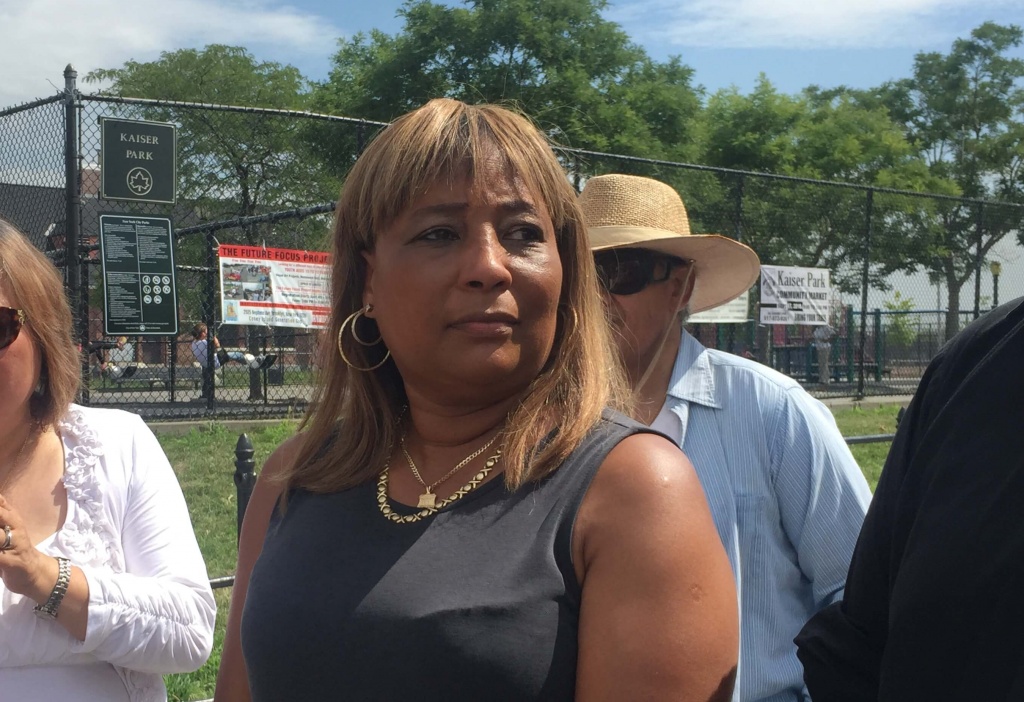After being accused of staying “too close” to the non-profit organization she founded in 2003, Assemblymember Pamela Harris, still in her first term as the representative for the 46th Assembly District, discussed the allegations at a Friday, July 15 press conference held to clear the air.
Responding directly to claims brought up against her in a New York Post article, a piece published on July 9 that questioned the validity behind some of the assemblymember’s campaign donations and non-profit-related tax filings, Harris maintained that it’s not an issue of her campaign and the non-profit (Coney Island Generation Gap) being closely tied, but a personal tie she has to the program’s participants.
“I just got elected; we’re not talking 99 years ago,” Harris said in Coney Island, right across the street from the CIGG facility – a Neptune Avenue home which she owns and where she started the organization. “I don’t have a closeness between my campaign and the non-for-profit, I have a closeness between people.”
“These are kids,” she continued. “They’re right here. Am I supposed to stop liking them because I’m the assemblywoman? Am I supposed to stop speaking to them when I see them? Let’s get real here.”
A large factor in the speculations surrounding Harris and the organization – which she headed up as executive director until her election – stem from the rep sharing an address with the CIGG facility. When directly asked why the youth enrichment program still operates out of her home, Harris cited limited government funding since the non-profit is not a salaried organization.
“The first floor is used for the program. I gave it to the kids,” she explained, adding that CIGG rents additional space right next to and behind the home as a film/photo studio and recording studio. “I live on the second and third floor. I couldn’t find space at all and I couldn’t get the city to help us get space because we [aren’t] salaried. To this day, no one [with the non-profit] receives a salary and that’s very difficult. You have to have salaried employees in order to get capital funding for a building.”
Additionally, Harris noted, as far as the speculations concerning the non-profit’s government tax dollars and spending, receipts filed with the Department of Youth and Community Development (DYCD) account for each purchase made – being that the money is first spent by the non-profit on rent for the adjacent locations, as well as utilities, equipment and maintenance, and is later reimbursed.
Harris also pointed out that the non-profit has been looking for an alternative space for quite some time and has turned to local schools like Mark Twain and P.S. 188 for possible after-school availability.
Councilmember Mark Treyger, who works closely with Harris as their districts overlap, was there to show his support for the non-profit and delve into some of the issues plaguing the “underserved district.”
“Pamela Harris worked for over 20 years in one of the toughest places you can work, Riker’s Island, and with many folks that got off on the wrong path in life,” said Treyger. “So when she worked and volunteered here in this community, and saw that there were many young people really going off on the wrong track, I think she saw the consequences of that. So, she rolled up her sleeves and worked with people to try to get kids off the street and to engage in meaningful programs and job skill training.”
The mission of CIGG, as stated on the non-profit’s website, is to enable “moderate and low income youth to build a strong path to their future, [a] strong character and realize their full potential as responsible citizens and leaders through the eyes of media arts.”
Because of the lack of available space in the community however, and now with rising speculation about Harris’ practices in sharing an address with the non-profit, Treyger is urging the community and politicians to work together in spite of their differences.
“Let’s work together to find some solution to these very pressing challenges,” Treyger said. “We need to work with the city administration, the state, with everybody to find solutions to these problems. Let’s put politics aside and let’s work together rather than engage in smear tactics and trying to bring people down.”
“CIGG, for me, is a family,” said high school student and longtime CIGG member Najee Jenkins. “I have one blood brother and one blood sister, [but] I have 10 other brothers and sisters right now and we look after and take care of [each other] to make sure that we all make it ahead in life. Taking pictures and making documentaries is one thing, but making sure that we get ahead [and that] we get the careers we want, that is what my true goal is.”

 Locals weigh in after Biden declares victory
Locals weigh in after Biden declares victory